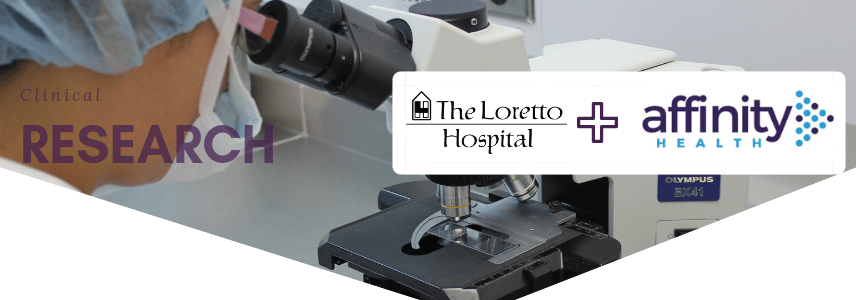Loretto Hospital Clinical Research Department
Loretto Hospital has launched a new FDA-approved clinical trials program! The new clinical trials program is a collaboration with, and fully funded by Affinity Health Together, Loretto Hospital and Affinity will research new effective and safe medical treatments for a host of medical conditions.

Current studies include:
- Asthma
- COVID-19
- Crohn’s Disease
- Heart Failure
- Pericarditis
- Low Testosterone
If you have been diagnosed with any of these conditions, you may qualify to participate in one of our studies. Qualified participants have access to:
- Free medication throughout the clinical trial
- Free health care over the course of the study
- Free transportation to doctor’s visits
- Compensation for your time
Help us improve the landscape of health and health care on the Greater West Side of Chicago.
To learn more about Loretto Hospital’s Clinical Trials program, or to learn how you or a loved one can participate in one of our studies, please fill out the form below or call (877) LTRIALS or (877) 587-4257
About Clinical Studies
Clinical studies are designed to add to medical knowledge related to the treatment, diagnosis, and prevention of diseases or conditions. Some common reasons for conducting clinical studies include:
- Evaluating one or more interventions (for example, drugs, medical devices, approaches to surgery or radiation therapy) for treating a disease, syndrome, or condition
- Finding ways to prevent the initial development or recurrence of a disease or condition. These can include medicines, vaccines, or lifestyle changes, among other approaches.
- Evaluating one or more interventions aimed at identifying or diagnosing a particular disease or condition
- Examining methods for identifying a condition or the risk factors for that condition
- Exploring and measuring ways to improve the comfort and quality of life through supportive care for people with a chronic illness
(Source: clinicaltrials.gov)
To learn more about clinical trials and clinical studies, clinicaltrials.gov or click here.
What is a clinical trial?
Who can participate?
Who should participate in a clinical trial?
What are the potential benefits and possible risks?
Benefits
- Clinical trials will give you exposure to new treatments.
- Clinical trials will allow you to be an active participant when it comes to your own healthcare.
- Most clinical trials are free.
Risks
- Treatment can have serious side effects.
- Treatment may not work.
What should people consider before participating in a clinical trial?
What if I choose not to participate?
Can a participant leave a clinical trial after it has begun?
What is informed consent?
What should you consider before participating in a trial?
There are many factors you should consider before committing to a clinical trial. Listed below are a few questions that may help you decide on whether the clinical trial is for you. It is strongly encouraged to ask questions about all clinical trials at the Lorreto hospital. We believe all are participants should be well informed before committing to any type of procedure.
- What is the purpose of the study?
- Who is going to be in the study?
- Why do researchers believe the experimental treatment being tested may be effective? Has it been tested before?
- What kinds of tests and experimental treatments are involved?
- How do the possible risks, side effects, and benefits in the study compare with my current treatment?
- How might this trial affect my daily life?
- How long will the trial last?
- Will hospitalization be required?
- Who will pay for the experimental treatment?
- Will I be reimbursed for other expenses?
- What type of long-term follow-up care is part of this study?
- How will I know that the experimental treatment is working? Will the results of the trials be provided to me?
- Who will be in charge of my care?
Who creates clinical trials?
Who administers the clinical trials at Loretto?
Who sponsors clinical trials?
What does “protocol” mean in clinical trials?
Protocols are detailed plans for the clinical trial. These break down what the study is for, how it will be done, and why it is being done.
What is a placebo?
What is a control or control group?
What are the different types of clinical trials?
-
Treatment Trials: Testing new treatment, therapy, and or medicine
-
Prevention Trials: Testing ways to better prevent a certain disease and or minimizing the impact of a disease
-
Screen Trials: Testing ways to identify health conditions or diseases
-
Diagnostic Trials: Testing ways to diagnose certain diseases or conditions
-
Quality of Life Trials: Testing ways to improve the quality of life for patients with chronic illnesses
What are the phases of clinical trials?
Clinical trials have various phases and each phase has a different purpose.
Phase I Clinical Trials - Researchers are testing a new drug/treatment
on a small sample size of individuals to determine dosage range and side effects
Phase II Clinical Trials - Researchers test the medicine and or treatment
on a larger group of individuals to further identify its safe usage
Phase III Clinical Trials - Researchers test the treatment and or new drug to an even larger group of people to confirm the results from the previous trials and gather any new information
Phase IV Clinical Trials - Market studies conducted to list out optimal usage of the medicine/treatment and all risks/benefits
What safeguards do we have in place to protect our participants in clinical research?
-
The Protocol Review Process
-
Informed Consent Procedures
-
The Patient Representative
-
The Patient Bill of Rights
